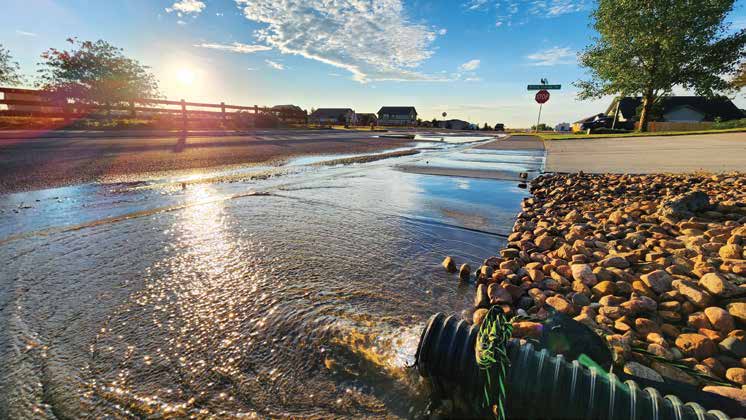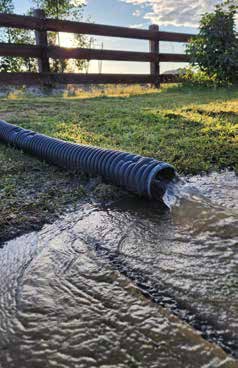Some residents in Falcon Highlands are frustrated because of groundwater that is seeping everywhere: Basements are flooded, the sump pumps are overworked and the excess groundwater is flowing freely throughout the neighborhood.

Bob Aamodt has lived in Falcon Highlands Filing 1 since 2008. For years, his sump pump saw no activity despite heavy rains at various times. In May 2021, his sump pump started pumping out water — and it hasn’t shut down since.
This past summer, Aamodt installed a three-quarter horsepower pump with an additional outlet hose. This high-power pump now runs 24/7 and is currently pumping 1.6 million gallons of water out of his home each month, he said. That amount of water could fill the Falcon Highlands Metro District’s water holding tank 1.5 times. (See the bucket test link at the end of this article.)
He said his neighbor on the south side of his home started receiving excessive groundwater as well in the spring of 2021, and was pumping it out up until late last year. Aamodt theorizes that the neighbor’s connecting lateral lines have since been blocked off because the clog in the mainline has grown larger. “As of May 2023, groundwater that previously backed up through the underdrain to that house has now found its way to a historically dry home across the street,” he said.
Aamodt said if the underdrain system is not properly maintained, it is going to further affect property values in the neighborhood, and he feels his property is currently unsellable in its current condition.
In early June, Kyle and Elizabeth Geitzenauer had 4 inches of water in their basement. Once that was cleared, more water appeared. Geitzenauer said he has replaced the sump pump several times, adding that he knows of many homeowners who have had to do the same. Mold has set in as well. Multiple engineers who have evaluated their house came to the same conclusion: Their house is sinking.
Cristina Welch has been in her home in Falcon Highlands Filing 1 for 17 years. She said the sump pump never ran until this past May, when it began continuously pumping out water. It hasn’t shut off since. They have replaced the sump pump twice and created an additional backup system, adding another sump pump. Welch said their sump pump is pumping 25 to 30 gallons of water per minute.
“The underdrain systems are intended to work as a first line of defense so our sump pumps don’t have to come on as often, if at all,” Welch said.
Some residents, including Welch, have hired engineers and they have all concluded that the underdrain system in Filing 1 is not functioning as intended and is either damaged or clogged.
The root of the problem
Most likely, the root of the problem is the underdrain system, said Billy Hudson, who lives in Falcon Highlands and also works for a utility maintenance company. Falcon Highlands was required to put in an underdrain system and also advised to avoid basements within the development.
An underdrain system is designed to collect subsurface water before it saturates road surface or the road ditch. By intercepting springs and groundwater, underdrains can help stabilize the road base, road ditches, and banks that would otherwise be softened by emerging springs and seeps. Underdrains prevent water from accumulating under the pavement and causing premature subgrade failure, according to a Penn State Technical Bulletin.
The underdrain system has holes in it so the water can go through it; however, it has to be encased in rock with netting on top of the rock so the dirt cannot get in and plug the holes, Hudson said. “Think of a burrito,” he said. The pipes are wrapped in rocks and netting.
The sump pump is placed in a basement to remove accumulated water from a basement or crawl space, basically to prevent flooding and maintain a dry area. The sump pump is attached to the drainage pipes. Hudson said the sump pump pumps water out from seepage that is usually from groundwater or springs. Hudson said he believes the amount of water from rain is the problem, and most likely the underdrain is clogged. He doubts that the pipes are broken somewhere. “In the hundreds we have dealt with, we only found two breaks in the system,” Hudson said.
He said the system needs to be maintained by someone. “Usually, the responsibility for infrastructures is turned over to metro districts after the development is finished,” he said.
Hudson said they need to have the underdrain system inspected to find out the cause of the excess groundwater.
So far, in Filing 2, the water is moving as it’s supposed to, exiting to creeks, he said.
Filing 3 should definitely be on hold until they get Filing 1 fixed, he said.
Aamodt believes the roadwork performed in 2020 could have “stirred things up and caused fine material to settle into the underdrain system,” which was installed as a requirement in the development to help mitigate the high groundwater conditions in the area. “It can take time for sediment to move down the line, but eventually it can build up and clog an underdrain system,” he said.
The Rolling Thunder issue
The residents from Falcon Highlands have had two meetings — one on Sept. 9 and the other on Oct. 7. More than 80 people attended the first one and about “55-plus” people attended the October meeting. In the September meeting, the issue of the county’s plans to repave Rolling Thunder Way was discussed. Welch and others are concerned that the work on the road could make things worse. From the meeting minutes, “Road repaving and compaction will disrupt the soils. As the underdrain system is already compromised and inaccessible, it is impossible to predict what type of impact this would have on the system. Potentially, new clogs or failure points could form along the line; and, as a result, additional homes could be impacted.
“Bridge paving over a compromised system without first addressing the condition of the underdrain system would be a waste of taxpayer money, as it will be significantly more expensive to address the underlying issues in the future.”
Carrie Geitner, county commissioner for District 2, told the NFH in a phone call on Oct. 27 that the county will work with the community and Welch to “minimize the impact” caused by the road work.
Taking responsibility
Welch contacted both Woodmen Hills and Falcon Highlands metro districts. According to Woodmen Hills, the excess water is groundwater, and that’s not their problem. Welch called Josh Miller, who represents Falcon Highlands, on May 1. He returned the call June 27 and said it’s not their problem either.
When the NFH called Miller in October, he said, “No comment.”
Welch, dissatisfied with the responses, began investigating the situation and reviewed numerous reports, from the development records to the Falcon Highlands master development drainage report. She tried to determine through her research the source responsible for the maintenance of the underdrain system.
According to El Paso County, the county transferred responsibility to the Falcon Highlands Metro District. And the metro district claims they have no document stating the county conveyed the responsibility to them.
In mid-October, Geitner called Welch to say their lawyers were finished reviewing the situation and concluded that in the planning stages it was clear that Falcon Highlands would be responsible for the underdrain system, but they also admitted that this responsibility was not as clearly defined as perhaps it should have been.
However, Geitner said, in a follow-up phone call and text to the NFH on Oct. 27, further research of the archived records indicate clearly defined intent. “We have historical documentation that clearly shows the intent is for the metro district to maintain this underdrain,” she said. “We are working to get that information to the metro district and the community for clarity and transparency.”
What now?
Aamodt said it has been six months since homeowners confirmed the existence of the underdrain system and brought its condition to the attention of the county and the metro districts, which includes Woodmen Hills.
“We need board members with integrity and honesty — a ‘golden rule’ mentality,” he said.
Currently, two board members have resigned; one of them has put his house up for sale. Two other board members are representatives of Challenger Homes.
Recently, a seat was vacated on the FHMD board. Active board members can appoint anyone to the position since it’s not an election year for them, but they have said they will consider homeowners. Aamodt and other neighbors have volunteered for the position. The next regular election is in 2025, and Aamodt said if he is not appointed this fall, he plans to run in the future.
Meanwhile, a recall of the Falcon Highlands board is in the works. Welch has hired lawyers and has filed a claim against Falcon Highlands Metropolitan District.
Water commissions weigh in
Dave Doran, president of the Upper Black Squirrel Ground Water District, said the commission has jurisdiction only for water rights. The state, however, has sent a letter to Falcon Highlands instructing them to file a replacement plan.

“The groundwater emerging from the ground is part of the alluvial aquifer system and it cannot be used for anything else,” Doran said. “The water comes from non-renewable aquifers. You can’t expose groundwater. You cannot waste groundwater for any reason.”
Doran agreed that Filing 3 should be on hold until the problems with Filing 1 are determined.
Doran said the groundwater is not safe. “It has effluent (sewage) in it; do not let kids play in it or ride their bikes through it.”
“Excessive rains did compound it (the groundwater excess) but the sheer volume of growth is part of the problem,” Doran said. This could be just the beginning of problems like this, he said.
Editor’s note: The New Falcon Herald will follow up with the Falcon Highlands saga in the next issue.
If anyone is interested in helping out with attorneys’ fees, visit the Go Fund Me account at https://www.gofundme.com/f/choffhd-donations.
Link for the bucket test: https://drive.google.com/file/d/1Oq9ayTsynkrjP2Ah5npVsOXyBUxa3aTi/view?usp=drive_link






